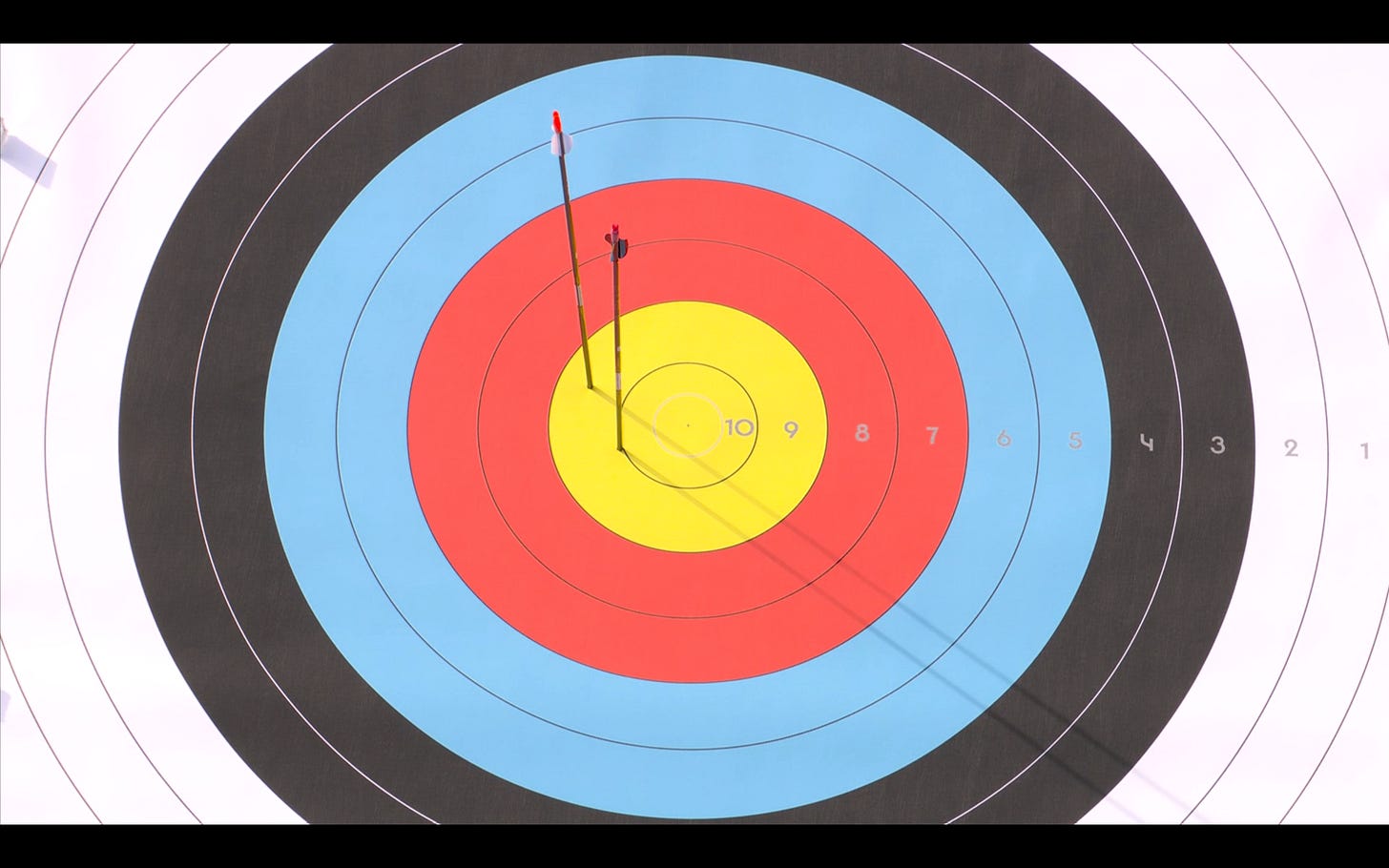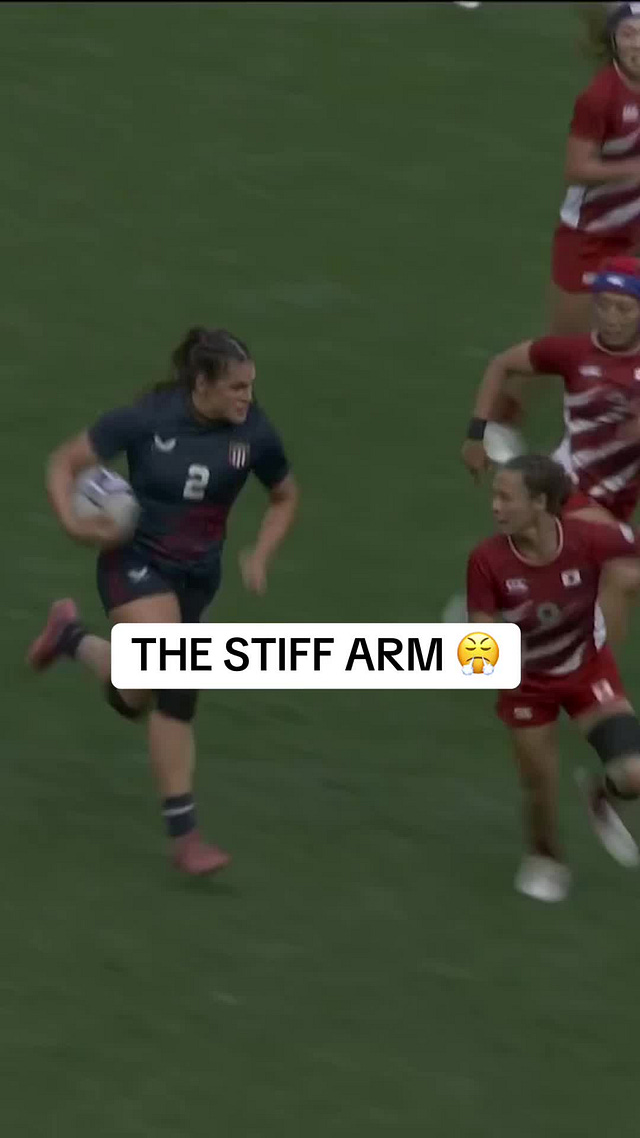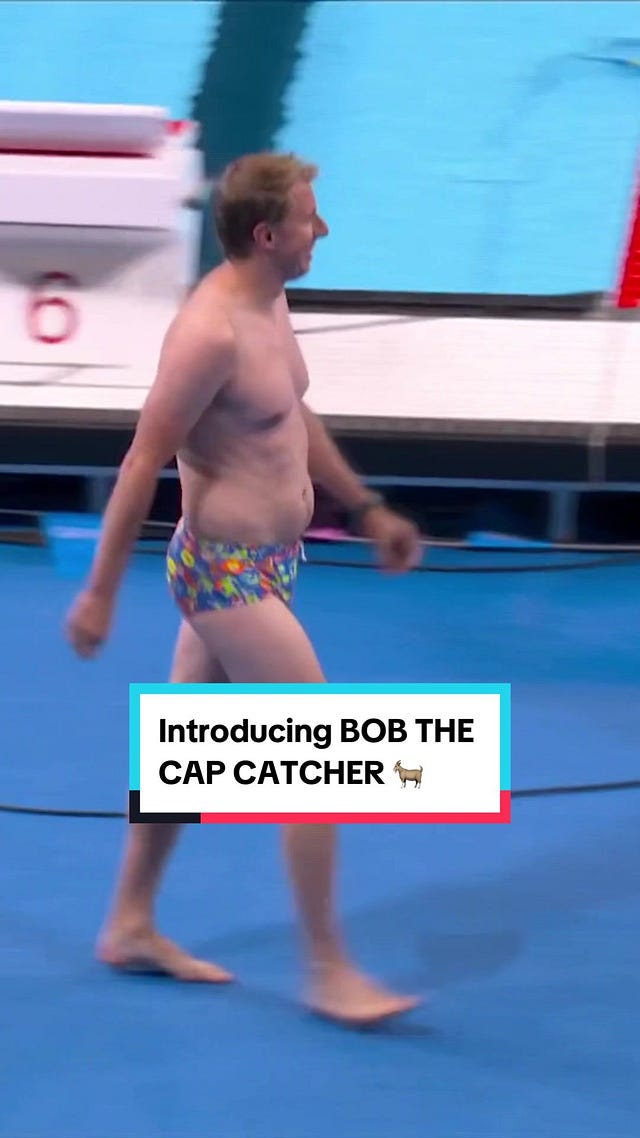Rings Roundup, Day 2: By the slimmest of margins
From swim races decided by milliseconds to archery matches decided by millimeters. Plus, Fencing, Andy Murray, and my beloved Zambia's women's soccer team
There are too many Olympic events for you to watch. That’s why I’m recapping the Olympics in newsletter form every day, letting you know about the previous day’s best moments, whether they happened in handball or kayak slalom. (Especially if they happened in handball.) We’re ranking th
Hot damn, swimming really has that “races decided by hundredths of a second” thing down. Here’s the final of the men’s 100 meter breaststroke, in which four racers finished within .08 seconds. You know how we use the expression “in the blink of an eye?” Well, a blink takes somewhere between .1 and .15 seconds, so yeah, this entire finish happened in the blink of an eye.
Italy’s Nicolo Martinenghi touched first at 59.03 seconds, Team USA’s Nic Fink and Great Britain’s Adam Peaty shared silver by each finishing in 59.05 seconds. Germany’s Melvin Imoudu was out of luck at 59.11,
The women’s 100 meter butterfly looked certain to go to Gretchen Walsh, who set an Olympic record in the semifinals. But in the race that mattered, her teammate Torri Huske chased her down and caught her at the wall, beating her by .04 seconds. Huske was on the right side of the infinitesimal time gap this time after missing a bronze medal by .01 seconds in Tokyo.
But there was another event on Sunday that was decided by an even slimmer margin—let’s give out some Olympic Rings to yesterday’s best moments.
Seven Rings: A Shootoff!
The greatest dynasty at the Olympics is the South Korean women’s archery team. They’ve won nine gold medals in a row—literally every single gold since the women’s event was added to the Olympics in 1988. They’re more dominant than Team USA’s men’s basketball team—they’re even more dominant than Team USA’s women’s basketball team.
They were set to dominate again in Paris. Lim Si-hyeon set a world record in the individual rounds, scoring 694 out of a potential 720 points. Then the team set an Olympic record in the team qualification round. They’d swept the last two gold medal matches in straight sets, and were expected to win again easily.
But the match ended up coming down to a single arrow. The two teams split the first four sets, requiring a shootoff where each of the three archers on each team got to shoot one shot. Then the shootoff appeared to be tied. The Archery Ref walked up to the board to inspect the arrows with a magnifying glass.
The Archery Ref was inspecting this shot by South Korea, which was on the very edge of the line between the 9 circle and the 10 circle.
If it was a 9, the shootoff would’ve been a tie, at which point the winner would’ve been the team with the closest shot in the shootoff, which was China. The Archery Ref determined that one of the Korean arrows scored as a 9 was actually touching the 10-line, extending South Korea’s gold medal streak to 10 in a row.
I’ve had some archery people tell me the magnifying glass inspection is actually somewhat common—BUT THE DRAMA WAS OFF THE CHARTS. And I’m not even Chinese or Korean. I simply couldn’t believe that I was watching the greatest dynasty in the Olympics come down to the width of a pencil tip.
Six Rings: USA vs. USA (but in a good way!)
At the USA Fencing media days a couple of months ago, I asked some of the fencers representing Team USA in the Olympics about an odd dynamic in their sport. In some events, fencers compete as a team—at the Olympics, those events will start tomorrow. But other times, they compete as individuals, and get drawn against each other in knockout brackets. “Oh, it happens all the time,” men’s foil fencer Gerek Meinhardt told me. “Almost every tournament we run into each other. It’s tough. We’ll argue on the strip and get fiery with each other, but we respect each other.”
I should’ve asked his wife, Lee Kiefer. On Sunday, that exact scenario played out on the biggest stage: Kiefer and her teammate Lauren Scruggs each won their half of the bracket and squared off for Olympic gold. Scruggs looked shocked when she won her semi to secure a medal.
Kiefer jumped for joy like she’d never won a match before. (She has—she won the gold in this event in 2020.)
The annoying thing about Olympic fencers is that they can’t simply be normal—they have to be elite athletes and geniuses. Scruggs is a Harvard undergrad and Kiefer is a medical student at the University of Kentucky who volunteers at reproductive rights organizations. Long story short, they’re both good at studying, and they were squaring off against opponents they practiced against for years.
In the end, the entire tournament was light work for Kiefer. She outscored her opponents 75-42 en route to gold. In bouts to 15, only one of her opponents managed more than 10 points. She beat Scruggs 15-6, but the good thing about facing your opponent in the gold medal bout is that they get a silver medal, too. The great thing about facing your opponent in the gold medal bout is you have to feel pretty good about helping them win another gold medal in the team event. (Tune in on Thursday!)
Five rings: French Swim Fans
So, bad news: France has a Michael Phelps replicant who dominates the same events as Phelps and is coaches by Phelps’ former coach. His name is Leon Marchand, and he should rack up three golds in Paris in the two individual medleys and the 200 meter butterfly, which should make him the most decorated medal-winner of the host nation and by default one of the heroes of the games.
It’s tough to have a home-pool advantage in swimming, an event where the competitors can’t really hear the crowd most of the time because they’re dunking their ears into water. But the French audience has figured it out. They cheered every time Marchand bobbed his head above water during the breaststroke portion of the IM, ensuring he knew they were cheering for him and not simply creating generic crowd noise. I believe it’s the first time an Olympic audience has united on a breaststroke-specific cheering strategy. (Update: People are telling me I’m a big dummy for acting like the breaststroke cheering strategy is a new invention. So I made it to Day 2 without saying something extremely incorrect about Olympic sports.)
With the crowd powering him home, Marchand broke Phelps’ Olympic record and won by nearly six seconds—Leon’s not into that “hundredths of a second” thing. The crowd has until Wednesday to figure out a butterfly-specific cheering strategy to get Marchand going in his other event.
Four Rings: Ilona hits the truck stick
Ballcarriers in football and rugby seem to have three primary philosophies when it comes to the people trying to tackle them. Some seek to avoid contact with speed and agility. Others know that to get past defenders, they sometimes must go through them.
And then there are runners like Team USA’s Ilona Maher, who seems to actively seek out opposing defenders to steal their strength for herself. She scored two violent tries in Team USA’s blowout group stage wins over Japan and Brazil, going Beast Mode her opponents like her name is Ilona Mahershawn Lynch:
 Tiktok failed to load.
Tiktok failed to load.Enable 3rd party cookies or use another browser
Maher has become an off-field superstar for her spectacular Olympic Village TikTok game—although she calls it the Olympic Villa, because she is a woman of taste who watches Love Island. But she didn’t get to Paris by making TikToks. She got there by wrecking anybody foolish enough to get in her way, so that’s bad news for whoever Team USA faces in the quarterfinals today.
Three Rings: Andy Murray Stays Alive
Not every star tennis player buys into the Olympic tennis, but Andy Murray always has. The lanky Scot will be remembered as the first British man to win Wimbledon in decades, but his career turning point was his Olympic victory in London and the golden vibe shift that came with it. Then he repeated at the Rio Olympics, becoming the first two-time Olympic singles champion.
He’s chosen to retire after the Paris games, a testament to the role the games play in his career. But he’s also retiring because he’s completely out of juice. He had two hip surgeries in 2018 and 2019, and has battled a back injury and torn ankle ligaments this season. He couldn’t muster the strength for a final Wimbledon send-off, withdrawing from the singles event, and apparently couldn’t stave off retirement long enough to play in the US Open in a few weeks. This is all he has left.
It looked like his run would be brief. He backed out of the singles tournament, and his first-round doubles match with Dan Evans was clearly going the way of the Japanese pair of Yoshohito Nishioka and Taro Daniel.
But Murray and Evans fought off five consecutive match points in a decisive tiebreak—which HAS to be some sort of record, because there simply aren’t that many situations when a tennis player can face five consecutive match points—and won the match and celebrated like they’d just won gold.
Murray’s Olympic appearance is a labor of love from a man whose tank is empty. All he wanted
Two rings: Bob
During heats of the women’s 100m breaststroke, Team USA’s Emma Weber lost one of her swim caps, which came to rest on the bottom of the Olympic pool. Surely, the cap could’ve stayed there and the rest of the swim meet could’ve continued with no issue.
Instead, an unidentified man emerged in a skintight floral speedo, dove to the bottom of the pool, and retrieved the cap. He then disappeared with the cap and was never seen again. He notably had a perfectly average physique, which is jarring to witness after days of watching the most physically fit humans on the planet.
The NBC announcers jokingly named him “Bob the Cap Catcher,” but his actual identity remains unknown. The Associated Press reported he was the pool lifeguard—the Olympics are often mandated to have one, which is pretty funny when everybody in the pool is one of the best swimmers on earth—but don’t lifeguards wear gear that says LIFEGUARD instead of floral speedos? And is swimcap removal one of their job responsibilities? And why did he emerge from nowhere and immediately vanish if his job is lifeguarding?
Somebody needs to drop their swim cap in the pool again to see if Bob magically shows up. But even if we never see him again, he’ll always be able to say he swam in the Olympics.
One Ring: PLEASE let Zambia win
All I want is for the Zambian women’s soccer team to win a game at the Olympians. The Copper Queens are led by Barbra Banda, legitimately one of the best players in the world—she made her NWSL debut this year, and is leading the undefeated Orlando Pride in scoring. In the Tokyo Olympics, she had back-to-back hat tricks… in a 10-3 loss to the Netherlands and a 5-5 tie with China. I imagine Barbra is not on speaking terms with her defenders and goalkeepers.
Sunday, it seemed like Banda would finally lead her nation to an Olympic win. Barbra scored a first-half hat trick against Australia and Zambia took a 5-2 lead… then allowed four unanswered goals, conceding in the 90th minute to lose 6-5.
It’s the second-highest scoring game in Olympic history, behind only Zambia’s 10-3 loss to the Netherlands last time around.
Zambia is essentially eliminated from contention, but they still have a game against Germany. I’m going to cry when Barbra scores five goals in a 13-6 loss.













I am working at Olympics, and reporting a lot, but those summaries are pure joy to read
These are wonderful Rodger and thank you for them.